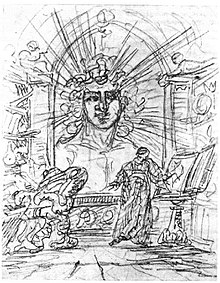| This article does not cite any sources. Please help improve this article by adding citations to reliable sources. Unsourced material may be challenged and removed. Find sources: "Erdgeist" – news · newspapers · books · scholar · JSTOR (December 2009) (Learn how and when to remove this message) |
| The topic of this article may not meet Misplaced Pages's general notability guideline. Please help to demonstrate the notability of the topic by citing reliable secondary sources that are independent of the topic and provide significant coverage of it beyond a mere trivial mention. If notability cannot be shown, the article is likely to be merged, redirected, or deleted. Find sources: "Erdgeist" – news · newspapers · books · scholar · JSTOR (July 2020) (Learn how and when to remove this message) |

Erdgeist is the spirit of the Earth that Johann Wolfgang von Goethe describes in Faust, Part One. 'Du, Geist der Erde, bist mir näher; schon fühl ich meine Kräfte höher,...' Goethe depicts Erdgeist as a timeless being who endlessly weaves on the loom of time—both in life and in death. In this conception, Erdgeist is the means by which the immaterial manifests itself.
In the German language, Erdgeist literally means "earth spirit". In the context of German folklore, Erdgeist specifically refers to a gnome, the earth elemental mentioned by Paracelsus.
Erdgeist is also an 1895 play by Frank Wedekind, which was adapted into a 1923 film directed by Leopold Jessner.
References
This article about a literature character is a stub. You can help Misplaced Pages by expanding it. |